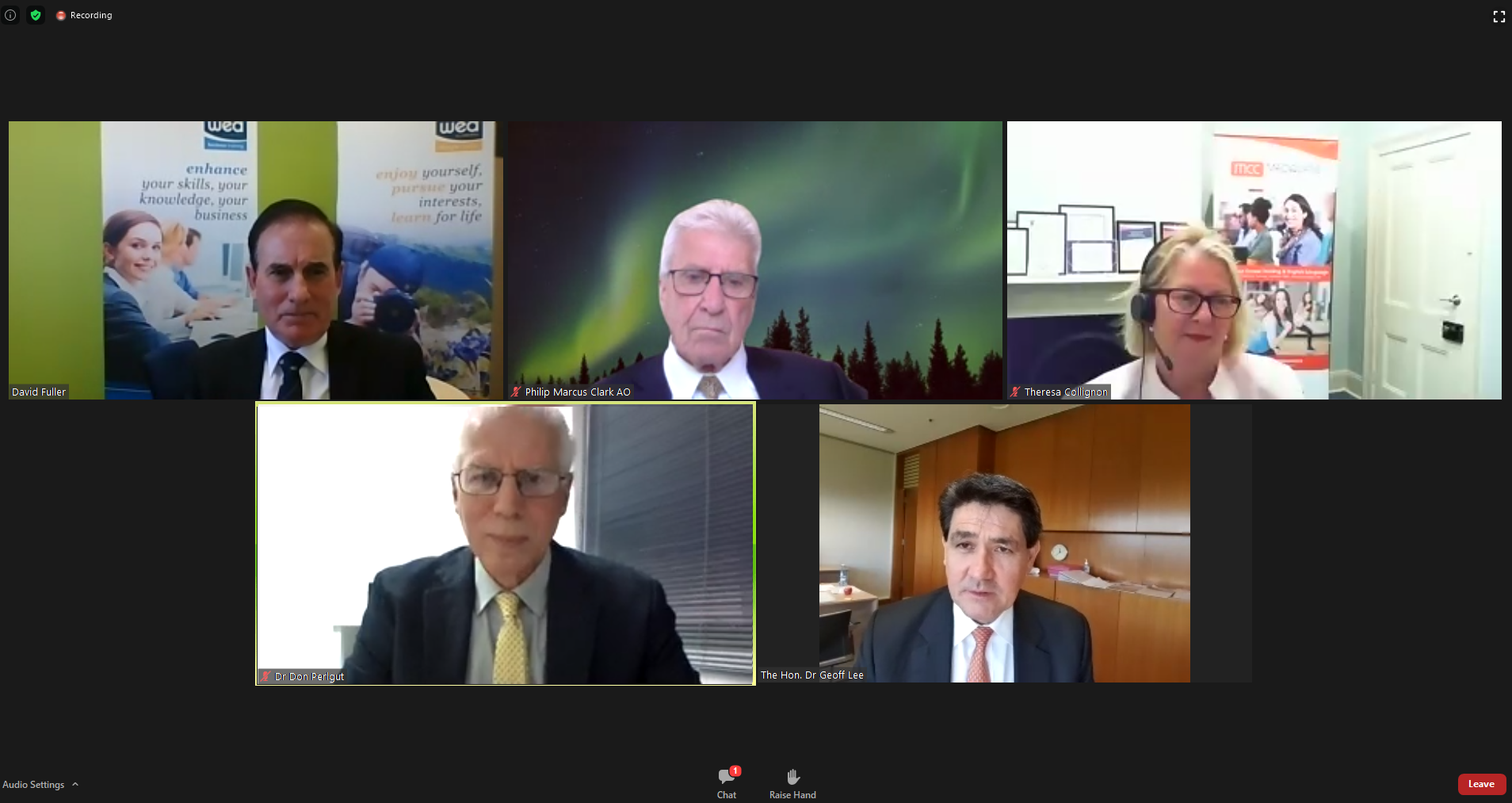Photo: David Fuller (CEO WEA Illawarra), Philip Marcus Clark AO (Chair NSW Skills Board), Theresa Collignon (CEO Macquarie Community College), Dr Don Perlgut (CEO Community Colleges Australia), The Hon Dr Geoff Lee MP (NSW Minister for Skills and Tertiary Education).
Macquarie Community College’s CEO, Theresa Collignon, was delighted to be part of the panel of speakers for the launch of the ACE Policy Statement by the Minister for Skills and Tertiary Education the Hon Dr Geoff Lee on Thursday 24 September 2020.
The “virtual” parliamentary event also announced the latest Community Colleges Australia Report. The Report continues to show how Community Colleges consistently out-perform other sectors in supporting vulnerable and disadvantaged clients.
“On almost all tracked measures of vulnerability and disadvantage, in 2019 NSW community education VET providers significantly over-performed compared to TAFE, private for-profit and other providers, disproportionately catering for students from the state’s most disadvantaged groups and regions.”
With nearly 100 attendees over Zoom, including 20 NSW Members of Parliament, Community Colleges Australia Members, senior staff from the NSW Department of Education, ASQA and NCVER, the NSW Minister for Skills and Tertiary Education, the Hon Dr Geoff Lee MP, reiterated that ”Community Colleges play a vital part in the state’s skills, and tap into areas where other providers do not, including people on the margins, who have difficulty engaging with training.”
He continued, “Skills is one of the state’s six points of recovery, an enabler of social mobility. With the state’s commitment to JobTrainer. Community Colleges will play an important part in that.”
In her address, Ms Collignon reinforced Macquarie Community College’s commitment to help people transition back to work, especially during these tough times. Improving foundation skills for employability, digital literacy, English speaking skills and numeracy continue to be important strategic deliverables for the College.
A Snapshot of the Report
It is crucial to note that the 2019 results remain consistent with results from government-funded VET data since 2016.
“In 2019, NSW ACE providers achieved the following percentage proportions of their government-funded VET student populations:
- 19.2% students with a disability(17.7% in 2018), compared to 11.7% of TAFE and government providers, 6.4.% of private for-profit providers and 5% of other VET providers;
- 64.5.% regional and rural students(61.5% in 2018), compared to 35.1% of TAFE and government providers, 30.1% of private for-profit providers and 35.5% of other providers;
- 55.7% most disadvantaged studentsin the bottom two SEIFA quintiles (55.1% in 2018), compared to 45.5% of TAFE and government providers, 45.7% of private for-profit providers and 51.7% of other providers;
- 13.2% non-English speaking background students(13% in 2018), compared to 21.1% of TAFE and government providers, 17.2% of private for-profit providers and 6.7% of other providers.
- 27.8% older (age 50+) students(27% in 2018), compared to 12.2% of TAFE and government providers, 14.4% of private for-profit providers and 7.9% of other providers.
- 13.1% Indigenous students(12.0% in 2018), compared to 9.7% of TAFE and government providers, 7.6% of private for-profit providers and 8.4% of other providers.
- Women:In 2019, 62.3% NSW ACE provider government-funded VET students were female (61.5%
in 2018), compared to 53.3% of TAFE, 47.9% of private for-profit providers, and 50.2% of other
providers. (Although women are not necessarily a disadvantaged group, they can be economically
vulnerable, which has occurred through the uneven economic and job loss impacts due to the
Coronavirus pandemic).“


